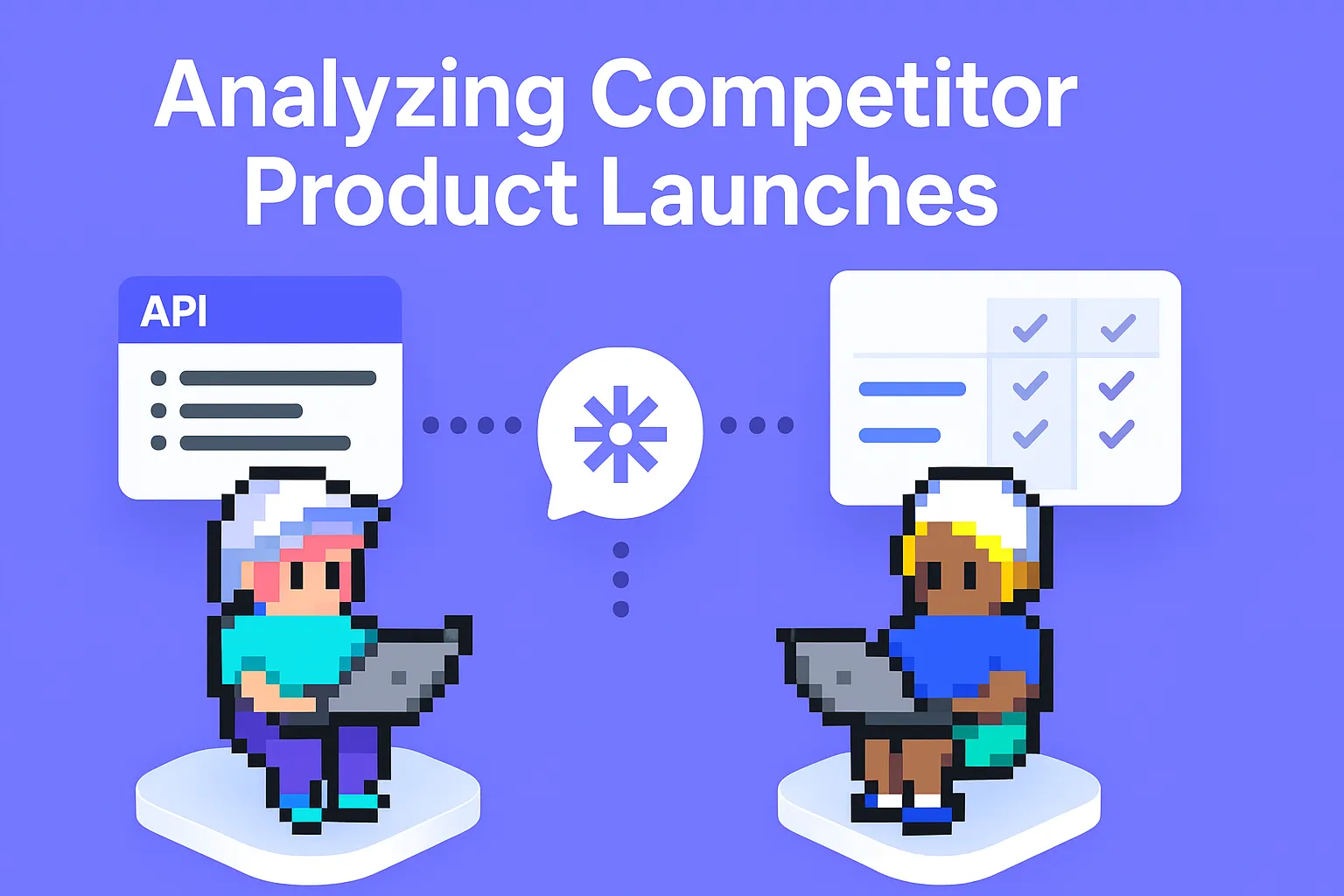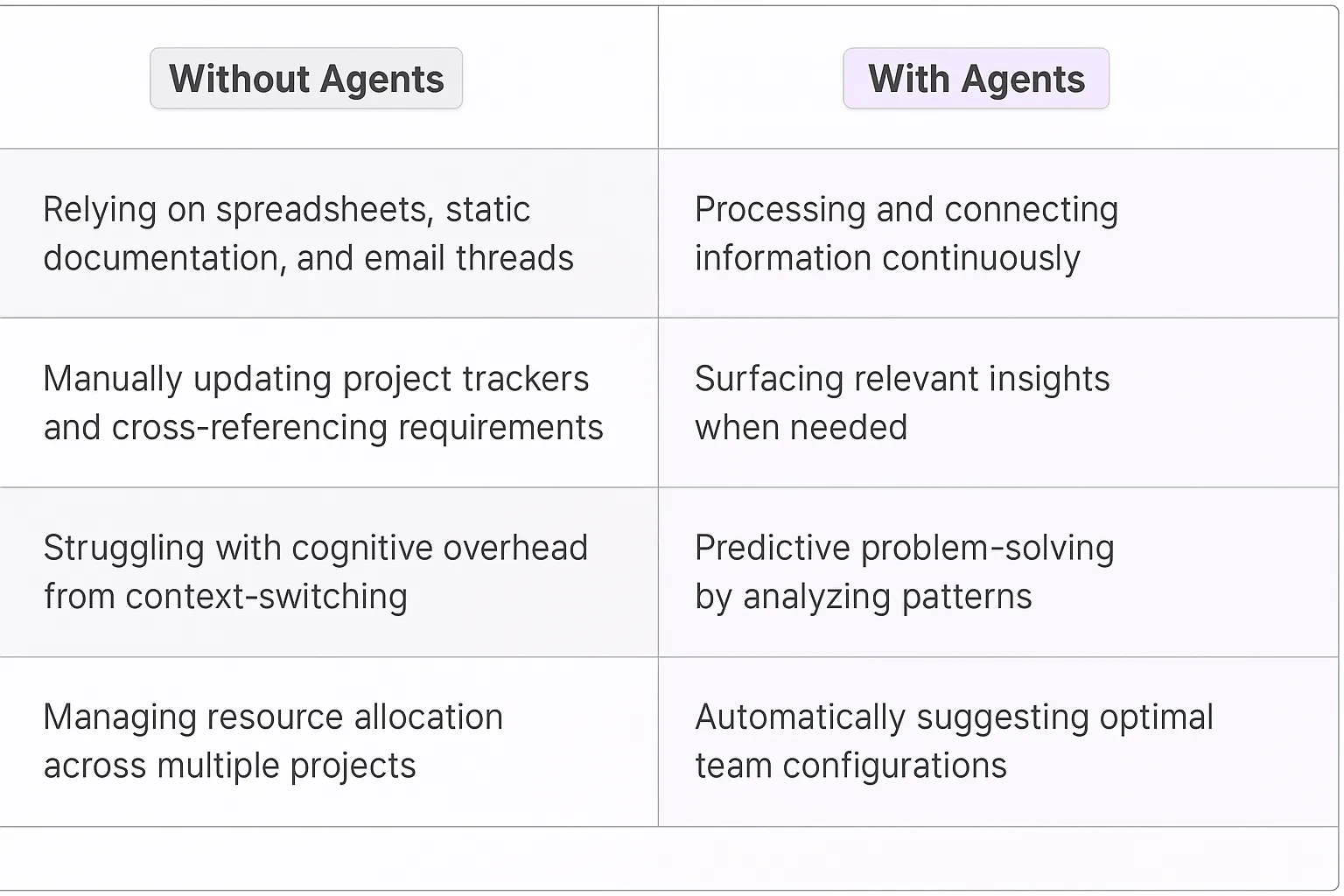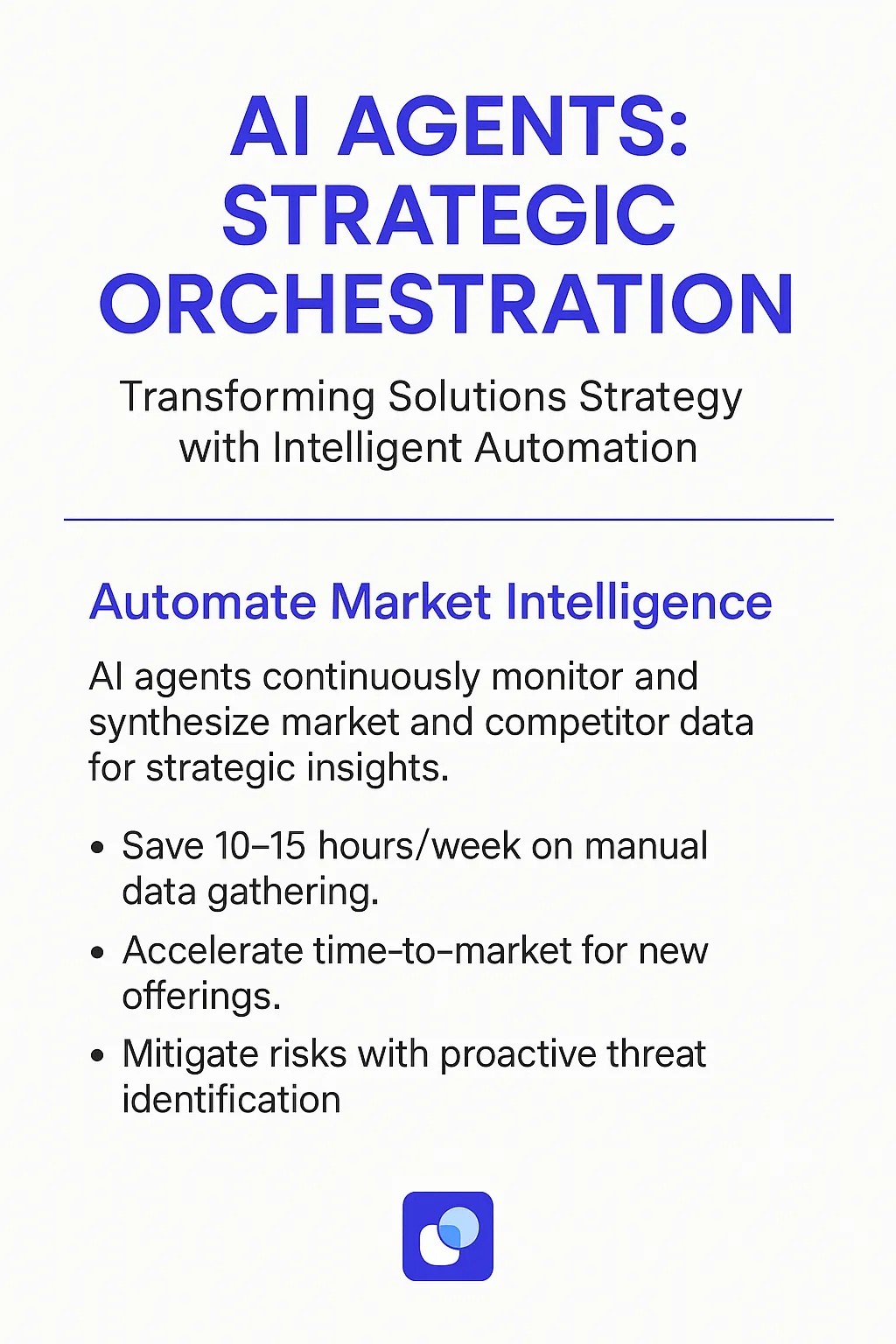Solutions Strategy Manager is a specialized role focused on developing and implementing strategic solutions across organizations. The position bridges the gap between technical capabilities and business objectives, requiring deep understanding of product architecture, market dynamics, and customer needs. With AI agents, this role evolves from manual coordination to strategic orchestration, leveraging intelligent systems to enhance decision-making and execution.

Strategy managers traditionally relied on a complex web of spreadsheets, static documentation, and endless email threads to track solutions and implementations. They'd spend countless hours manually updating project trackers, cross-referencing customer requirements, and coordinating between product and engineering teams. The cognitive load was intense - they had to simultaneously maintain deep product knowledge while managing multiple stakeholder relationships.
The introduction of AI agents into solutions strategy creates a fascinating network effect. These digital teammates function as knowledge multipliers, fundamentally changing how strategy managers operate. They're not just handling tasks - they're augmenting human capabilities in ways that scale exponentially.
When a solutions strategy manager deploys AI agents, they gain:
The most compelling aspect is how AI agents enable strategy managers to focus on high-leverage activities like relationship building and strategic planning. The agents handle the heavy lifting of information management and coordination, creating a multiplier effect on productivity that grows stronger over time as the agents learn from each interaction.
This shift represents a step-function change in how solutions strategy operates. We're moving from a world of manual coordination to one where AI agents serve as an intelligent layer that connects people, knowledge, and processes in real-time.

When we look at Solutions Strategy through the lens of network effects and growth loops, AI agents create fascinating compounding advantages. The digital teammates aren't just handling discrete tasks - they're building an interconnected system of market intelligence, customer insights, and strategic planning.
The most powerful aspect is how these AI agents learn and adapt from each interaction. Every market analysis they perform, every competitive insight they surface, feeds back into making future strategic recommendations more nuanced and contextual. This creates a flywheel effect where the solution strategy becomes increasingly sophisticated over time.
What's particularly interesting is how this shifts the role of Solutions Strategy Managers from information gatherers to insight synthesizers. The AI handles the heavy lifting of data collection and initial analysis, allowing strategists to focus on higher-order pattern recognition and strategic decision-making.
This is a classic example of technology expanding the possible rather than simply automating the existing. The AI agents aren't just making current processes more efficient - they're enabling entirely new approaches to solution strategy that weren't feasible with traditional human-only teams.

The integration of AI agents into Solutions Strategy roles represents a fundamental shift in how organizations approach strategic planning and execution. Drawing from my experience working with growth-stage companies, I've observed AI agents becoming critical players in the strategic decision-making process. They're not just tools - they're digital teammates that enhance human capabilities in ways that were previously impossible.
Solutions Strategy Managers face complex challenges that require processing vast amounts of data while maintaining strategic clarity. AI agents excel at parsing through market research, competitive intelligence, and customer feedback to surface actionable insights. They can identify patterns across disparate data sources that humans might miss, enabling more informed strategic decisions.
What's particularly fascinating is how these AI agents adapt to different industry contexts. In healthcare, they help Solutions Strategy Managers navigate complex regulatory requirements while optimizing patient care pathways. In financial services, they assist in developing personalized product strategies by analyzing market trends and customer behavior patterns. Tech companies leverage them to identify emerging market opportunities and potential disruption risks.
The key differentiator here isn't just the technology - it's the symbiotic relationship between human strategic thinking and AI-powered analysis. This partnership creates a new paradigm for strategic planning that combines human creativity with computational precision.
The healthcare technology sector presents a fascinating application for Solutions Strategy Manager AI agents. When I worked with several digital health startups, I noticed a common pattern - they struggled to balance technical capabilities with real clinical needs. A Solutions Strategy Manager AI agent transforms this dynamic by analyzing vast datasets of clinical workflows, regulatory requirements, and technology implementation histories.
Take the case of a mid-sized hospital network implementing new patient engagement technology. The Solutions Strategy Manager AI agent continuously monitors key performance indicators across departments, identifying bottlenecks in adoption and gaps between intended and actual usage patterns. It pulls data from electronic health records, staff feedback, and patient satisfaction scores to build comprehensive solution roadmaps.
What makes this particularly powerful is the agent's ability to detect subtle patterns that humans might miss. For instance, when analyzing why certain departments showed resistance to new telehealth platforms, the AI agent identified specific workflow friction points - like the extra clicks required for documentation - that weren't obvious in initial assessments.
The agent then crafts targeted recommendations, such as suggesting specific API integrations or user interface modifications, while ensuring compliance with HIPAA and other healthcare regulations. It's like having a strategic advisor who simultaneously understands technical architecture, clinical workflows, and regulatory frameworks.
Most importantly, the Solutions Strategy Manager AI agent adapts its recommendations based on real-time feedback and outcomes. When a suggested integration proves successful in the cardiology department, the agent automatically evaluates similar opportunities in other specialties, creating a continuous improvement loop that scales across the organization.
This healthcare example demonstrates how Solutions Strategy Manager AI agents don't just solve immediate problems - they create compound effects that drive long-term organizational transformation while maintaining focus on practical, implementable solutions.
While building products at fintech companies, I observed how Solutions Strategy Manager AI agents are reshaping the way financial institutions develop and deploy new offerings. The complexity of modern banking products, combined with shifting regulatory landscapes and evolving customer expectations, creates a perfect testing ground for AI-driven strategy.
A large credit union I worked with deployed a Solutions Strategy Manager AI agent to optimize their digital banking transformation. The agent analyzed transaction patterns, customer service interactions, and competitive offerings across their retail and commercial banking segments. What's fascinating is how it uncovered non-obvious correlations between specific banking features and customer retention rates.
The AI agent detected that small business customers who used both mobile check deposits and wire transfers were 3.4x more likely to expand their relationship with the bank. This insight led to a complete redesign of the small business banking journey. The agent then mapped out technical dependencies, vendor integrations, and compliance requirements to create a phased implementation plan.
One of the most powerful aspects was the agent's ability to simulate different solution scenarios. When evaluating a new payment processing system, it ran thousands of simulations incorporating variables like transaction volumes, peak usage times, and potential failure points. This level of analysis would take human teams months to complete.
The agent continuously monitors market trends, regulatory updates, and customer feedback to refine its recommendations. When a competitor launched a new business lending platform, the agent automatically analyzed the offering and suggested specific feature enhancements to maintain competitive advantage while ensuring compliance with banking regulations.
This financial services example shows how Solutions Strategy Manager AI agents create compound network effects - each insight builds upon previous learnings, creating an ever-expanding knowledge base that drives increasingly sophisticated strategic decisions. The key is how they bridge the gap between high-level strategy and practical implementation details.
Building and deploying Solutions Strategy Manager AI agents requires careful planning across multiple dimensions. The complexity goes beyond simple implementation - it touches core business processes and requires a deep understanding of both technical capabilities and human workflows.
The technical stack supporting Solutions Strategy Manager agents needs robust architecture decisions from day one. Data integration becomes a critical challenge, as these agents need to pull information from CRMs, project management tools, and internal knowledge bases. Many organizations struggle with data silos and inconsistent APIs, forcing development teams to build custom connectors.
Natural language processing capabilities must be fine-tuned specifically for solutions strategy terminology and industry-specific jargon. Without this specialization, agents may misinterpret crucial context in customer requirements or miss subtle implications in technical specifications.
Solutions strategists often rely on tacit knowledge and pattern recognition built through years of experience. Training AI agents to replicate this expertise requires extensive knowledge engineering. The process of documenting decision frameworks and success patterns often reveals gaps in existing processes.
Change management becomes particularly complex when implementing these agents. Solutions teams typically have established workflows and relationships with both customers and engineering teams. Introducing AI agents into these dynamics requires careful consideration of handoff points and clear ownership of decisions.
The most successful implementations treat AI agents as digital teammates rather than replacements. This means designing interaction patterns that complement human expertise rather than attempting to automate entire workflows. Solutions strategists should maintain ownership of key client relationships and strategic decisions while leveraging AI agents for research, analysis, and routine tasks.
Creating feedback loops between human strategists and AI agents helps improve accuracy over time. Regular calibration sessions where teams review agent recommendations help identify edge cases and refine decision models.
Traditional metrics like time-to-solution or number of proposals processed don't fully capture the impact of Solutions Strategy Manager agents. Organizations need new frameworks that measure both quantitative efficiency gains and qualitative improvements in solution quality. This might include tracking the complexity of solutions proposed, innovation metrics, or customer satisfaction with strategic recommendations.
The integration of AI agents into Solutions Strategy Management marks a fundamental shift in how organizations approach strategic planning. These digital teammates don't just automate existing processes - they create new possibilities for strategic thinking and execution. The network effects generated by continuous learning and adaptation lead to increasingly sophisticated strategic capabilities over time. Organizations that successfully implement these AI agents gain a significant competitive advantage through enhanced decision-making, faster execution, and more nuanced strategic planning. The future of solutions strategy lies in this symbiotic relationship between human creativity and AI-powered analysis.